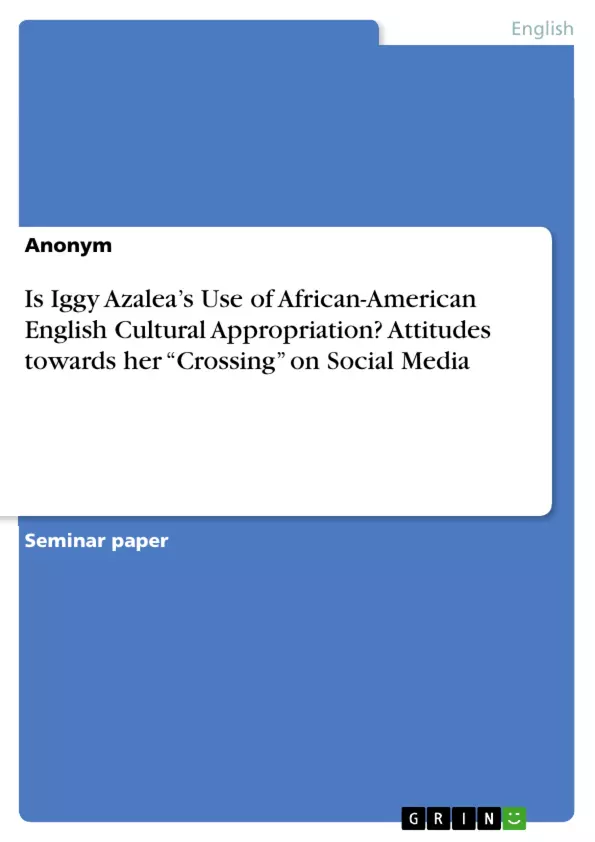Iggy Azalea, a white Australian hip-hop artist, uses African American Vernacular English when rapping. Whether this act of "crossing" is cultural appropriation was debated on social media and in the news. The question this paper aims to answer is, if the wider audience on YouTube has a negative attitude towards Azalea’s “crossing”. Considering the extensive media coverage, of which a substantial part was critical of Azalea’s language use during performance, the hypothesis is that the majority of the YouTube audience is negative towards this issue.
But before the data can be analysed, there is essential information that requires to be provided. This information will be given in the next part and it includes Iggy Azalea’s biographical background as well as relevant terms and concepts, namely African American English, the hip-hop nation and its language, and “crossing”. Moreover, the study by Eberhardt and Freeman shall be presented in more detail. Before moving on to the empirical part of this paper, where comments below the music videos “Work” and “Fancy” are analysed, there shall be a short excursion on language attitudes and how to research them. Then, having presented and analysed the results of the study, the findings shall be discussed until finally some concluding remarks are made.
Table of Contents
- Introduction
- Iggy Azalea's “crossing” to AAE explained
- Who exactly is Iggy Azalea?
- The African American English variety
- The Hip-hop nation and its language
- The phenomenon of crossing
- Bringing everything together: Azalea's use of AAE in her music
- Researching language attitudes
- Language attitudes
- The societal treatment approach
- Data and methods
- Iggy Azalea's song “Work” (2014)
- Iggy Azalea's song \"Fancy\" (2014)
- Content analysis of Youtube comments
- Discussion
- Conclusion
Objectives and Key Themes
This paper aims to analyze YouTube comments on Iggy Azalea's use of African American English (AAE) in her music performances. The primary objective is to determine if the wider YouTube audience holds a negative attitude towards Azalea's "crossing" (Rampton 2005), or adopting features of a language variety not native to her. This study aims to contribute to the understanding of language attitudes and perceptions of code-switching in the context of hip-hop culture.
- Iggy Azalea's use of AAE and its controversial reception
- The concept of "crossing" and its implications in language and identity
- The relationship between African American English, hip-hop culture, and language attitudes
- The role of social media platforms like YouTube in shaping perceptions of language and identity
- The analysis of language attitudes through content analysis of YouTube comments
Chapter Summaries
The introduction presents the controversial nature of Iggy Azalea's use of AAE in her music and sets the research question: does the YouTube audience hold a negative attitude towards her "crossing" to AAE? It also provides background information on Azalea's career and relevant concepts like AAE, the hip-hop nation, and "crossing."
Chapter 2 delves deeper into Azalea's biography, providing insights into her upbringing and rise to fame in the hip-hop industry. It also offers a concise overview of African American English as a distinct linguistic system, discussing its origins and characteristics. Additionally, the chapter examines the role of the hip-hop nation and its language in relation to AAE, highlighting the close connection between the two.
Chapter 3 discusses the topic of language attitudes and how they can be researched. It explores the societal treatment approach, a method used to understand how languages are perceived and evaluated within society. This chapter lays the foundation for the empirical analysis in the subsequent chapters.
Chapter 4 details the methodology and data sources for this study. It focuses on the two specific songs chosen for analysis – "Work" and "Fancy" – and outlines the process of content analysis for YouTube comments.
Keywords
The primary keywords and focus topics of this paper include Iggy Azalea, African American English (AAE), hip-hop culture, "crossing," language attitudes, code-switching, societal treatment approach, YouTube comments, content analysis, and social media.
Frequently Asked Questions
Why is Iggy Azalea’s use of AAE considered controversial?
Iggy Azalea is a white Australian artist who uses African American Vernacular English (AAE) in her rap performances. Critics view this as "cultural appropriation" or "crossing."
What does the term "crossing" mean in linguistics?
"Crossing" refers to the use of a language variety or dialect that does not belong to the speaker's native ethnic or social group, often to adopt a certain identity.
How does the YouTube audience react to Azalea’s language use?
The study analyzes comments under videos like "Work" and "Fancy" to determine if the audience holds a negative attitude towards her adoption of AAE features.
What is the "societal treatment approach" in research?
It is a method used to research language attitudes by observing how languages or varieties are treated and evaluated within a society or on social media platforms.
What is the connection between Hip-hop and African American English?
AAE is the foundational variety of the "Hip-hop nation." Authenticity in Hip-hop is often tied to the use of this specific linguistic system.
What was the hypothesis regarding the YouTube audience's attitude?
Given the critical media coverage, the hypothesis was that the majority of the YouTube audience would also hold a negative view of her "crossing" to AAE.
- Quote paper
- Anonym (Author), 2019, Is Iggy Azalea’s Use of African-American English Cultural Appropriation? Attitudes towards her “Crossing” on Social Media, Munich, GRIN Verlag, https://www.grin.com/document/1254827



